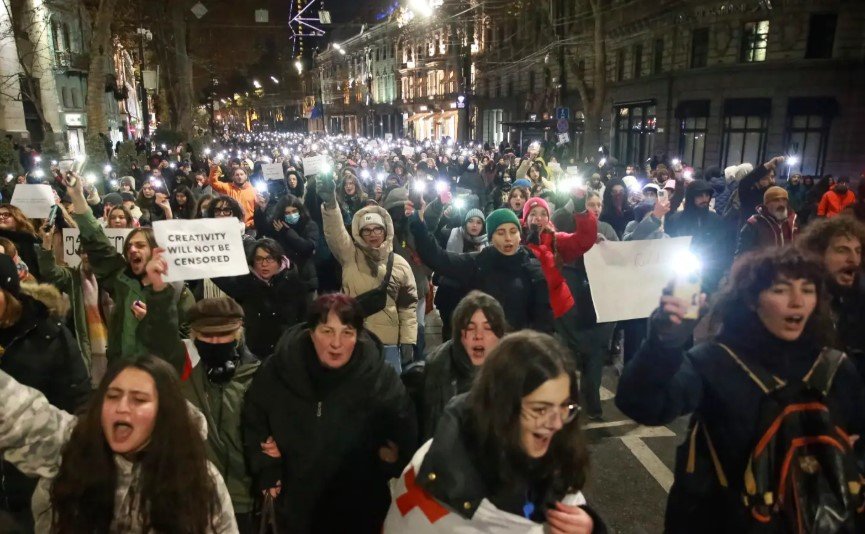On Sunday, former footballer Mikheil Kavelashvili was sworn in as the new president of Georgia. His victory, a product of a system that replaced direct presidential elections with a parliamentary electoral college, is seen by many as a consolidation of power for the ruling Georgian Dream party. Critics argue that his inauguration, which took place without significant opposition participation, signals a troubling shift toward closer ties with Russia and away from the European Union.
A Divisive Victory: The Georgian Dream’s Stronghold
Kavelashvili’s election, where he was the sole candidate on the ballot, was almost a foregone conclusion. The Georgian Dream party, which holds significant sway over Georgia’s 300-seat electoral college, ensured his victory in a process that has drawn harsh criticism. The electoral college is made up of members of Parliament, municipal councils, and regional legislatures, all heavily influenced by the current ruling party.

The victory is seen as part of a broader trend in Georgian politics, where the ruling party has retained control of Parliament following October’s election. However, opposition groups have decried the election results, claiming that the vote was tainted by irregularities and possibly even foreign interference. They argue that Moscow’s influence played a role in securing a victory for the Georgian Dream party.
In a defiant statement, Georgia’s outgoing pro-Western president, Salome Zourabichvili, who refused to attend the inauguration, labeled Kavelashvili’s ascension as a “parody.” Speaking outside the Orbeliani Palace in Tbilisi, Zourabichvili told supporters, “I bring legitimacy with me,” signaling her rejection of the new president’s authority.
EU Integration at Risk: A Battle of Ideologies
Kavelashvili’s inauguration has sparked fears that Georgia’s path toward European Union membership may be at risk. While the Georgian Dream party has pledged to continue pursuing EU accession, its simultaneous efforts to reset ties with Russia have raised alarms among pro-Western factions in the country.
The European Union has long seen Georgia as a potential member, but the shift in leadership could complicate this trajectory. Kavelashvili’s rhetoric during his inauguration speech, which emphasized national unity and mutual respect, did little to assuage fears that Georgia might pivot away from the West.
Opposition leaders, including prominent figures from Georgia’s pro-Western parties, have demanded a rerun of the election, citing widespread allegations of electoral fraud and foreign interference. They argue that the ruling party’s close ties with Russia undermine Georgia’s pro-European stance and could halt any meaningful progress toward EU integration.
Georgia’s geopolitical positioning has always been precarious, lying at the crossroads between Europe and Russia. As the EU’s interest in the region grows, Georgia has found itself at a crossroads, with the current leadership aligning more closely with Moscow, a former imperial power that many Georgians view with distrust.
The Public Outcry and Calls for Change
The protests surrounding Kavelashvili’s election underscore the deep divisions in Georgian society. The opposition’s boycott of post-election parliamentary sessions and their demand for a rerun of the vote reflects the intensity of the political crisis. Many Georgians view the Georgian Dream party’s grip on power as a threat to democratic principles and national sovereignty.
In Tbilisi and other cities across the country, demonstrators have taken to the streets, calling for a return to direct presidential elections and greater transparency in the electoral process. Despite the ruling party’s insistence on the legitimacy of the election, the ongoing unrest signals a broader distrust in the government’s handling of Georgian democracy.
This widespread dissatisfaction is not only a reflection of internal political dynamics but also a response to Georgia’s place in the region. As Russia asserts its influence over former Soviet republics, including Georgia, many fear that the nation’s sovereignty is increasingly at risk. The specter of Russian interference looms large over Georgia’s future, and many citizens remain wary of any political alignment that could lead to a closer relationship with the Kremlin.
The Long Road Ahead: Can Georgia Retain Its EU Aspirations?
As Georgia enters this new chapter under Kavelashvili’s presidency, the question remains: can the country still pursue its aspirations of EU membership? The ongoing political crisis suggests that Georgia’s journey toward Europe could become more complicated, but the outcome remains uncertain.
The EU’s stance on Georgia has always been cautiously optimistic, but the bloc has made it clear that it expects democratic reforms, transparency, and adherence to the rule of law from potential candidates. Georgia’s ability to maintain its pro-European course, especially under a leadership that has shown increasing signs of rapprochement with Russia, is now in doubt.
For many Georgians, the EU remains a symbol of prosperity and democratic values. Yet, the shifting political landscape, marked by growing ties with Russia and the opposition’s rejection of the current government, threatens to unravel years of progress toward European integration. The coming months will be crucial in determining whether Georgia can overcome its political divides and remain on course toward a future with the European Union.
